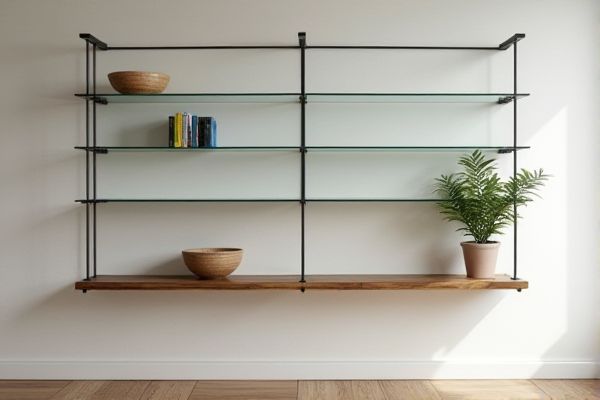
Glass shelves offer a sleek, modern aesthetic and are resistant to stains and moisture, making them ideal for bathrooms or kitchens, while wood shelves provide a warm, classic look with stronger load-bearing capacity and easier customization. Explore this comparison to discover which material best suits Your space and style needs.
Table of Comparison
| Feature | Glass Shelf | Wood Shelf |
|---|---|---|
| Material | Tempered or frosted glass | Solid wood or plywood |
| Durability | Strong but prone to shattering | Highly durable, can warp or scratch |
| Weight Capacity | Moderate, suited for lightweight items | High, supports heavy loads |
| Aesthetics | Modern, sleek, transparent look | Warm, natural, versatile finishes |
| Maintenance | Requires frequent cleaning to avoid smudges | Needs occasional polishing and protection |
| Cost | Generally higher due to glass quality | Varies, often more affordable |
| Installation | Requires careful handling and support brackets | Easy to install with screws or brackets |
| Safety | Risk of breakage, safety glass reduces hazard | Low risk, sturdy and reliable |
Introduction to Glass and Wood Shelves
Glass shelves offer a sleek, modern aesthetic with high durability and resistance to moisture, making them ideal for bathrooms and kitchens. Wood shelves provide a warm, natural look with versatile design options, but require more maintenance due to susceptibility to moisture and wear. Choosing between glass and wood shelves depends on desired style, durability needs, and environmental factors.
Aesthetic Appeal: Glass vs Wood Shelves
Glass shelves offer a sleek, modern aesthetic with a transparent quality that enhances light flow and creates an illusion of space, making them ideal for contemporary and minimalist interiors. Wood shelves provide a warm, natural appeal with rich textures and grain patterns, adding character and a timeless charm suitable for rustic or traditional decor. Choosing between glass and wood shelves depends on the desired visual impact and the style of the environment where they will be installed.
Durability and Strength Comparison
Glass shelves offer a sleek, modern look but typically have lower durability and strength compared to wood shelves, as they are prone to cracking under heavy loads or impact. Wood shelves, especially hardwood variants like oak or maple, provide superior strength and can support heavier items without bending or breaking, making them more reliable for long-term use. Your choice depends on whether you prioritize aesthetic appeal or robust durability for your shelving needs.
Weight Capacity and Support
Glass shelves provide a sleek and modern look but typically have a lower weight capacity, often supporting up to 25-50 pounds depending on thickness and mounting hardware. Wood shelves offer superior strength and durability, supporting heavier loads in the range of 50-100 pounds or more, making them ideal for storing bulky or heavy items. Choosing the right option depends on Your need for weight support balanced with aesthetic preferences and space functionality.
Maintenance and Cleaning Differences
Glass shelves require regular wiping with glass cleaner or a mixture of water and vinegar to prevent streaks and smudges, while wood shelves benefit from dusting with a microfiber cloth and occasional polishing with wood-specific products to maintain their finish. Glass is resistant to moisture and stains, making it easier to clean without worrying about water damage, whereas wood shelves need careful maintenance to avoid warping and discoloration from excessive moisture. Cleaning glass shelves is generally faster and leaves a shiny surface, whereas cleaning wood shelves involves more delicate care to preserve the material's texture and color.
Cost Analysis: Glass vs Wood Shelves
Glass shelves generally cost more upfront than wood shelves due to material and manufacturing expenses, with prices ranging from $30 to $100 per linear foot depending on thickness and finish. Wood shelves offer a more budget-friendly option, typically priced between $15 and $60 per linear foot, influenced by wood type such as pine, oak, or walnut. Your choice should factor in maintenance costs, as glass requires careful cleaning to avoid scratches, while wood may need periodic refinishing to maintain its appearance and durability.
Versatility in Interior Design
Glass shelves offer unparalleled versatility in interior design by creating an illusion of space and complementing modern, minimalist aesthetics. Wood shelves bring warmth and texture, easily adapting to rustic, traditional, or contemporary styles with a variety of finishes and grains. Both materials enhance functionality, but glass shelves excel in sleek, airy environments while wood shelves provide a cozy, natural ambiance.
Environmental Impact and Sustainability
Glass shelves offer higher durability and recyclability, making them a more sustainable choice with lower long-term environmental impact compared to wood shelves, which typically involve deforestation and carbon emissions during production. Wood shelves sourced from certified sustainable forests can reduce ecological damage but still contribute to habitat disruption and require more frequent replacement due to wear and susceptibility to moisture. Choosing recycled or reclaimed materials for both glass and wood shelves further minimizes resource depletion and enhances environmental responsibility.
Common Applications and Best Use Cases
Glass shelves are commonly used in modern homes, retail displays, and bathrooms due to their sleek appearance and ability to showcase items without obstructing views. Wood shelves excel in traditional settings, offices, and libraries where durability, warmth, and a classic aesthetic are priorities. For heavy or bulky items, wood shelves provide superior support, while glass shelves are best suited for decorative and lightweight objects.
Final Verdict: Choosing the Right Shelf for Your Space
Glass shelves offer a sleek, modern look that enhances light flow and creates a sense of openness, making them ideal for contemporary or smaller spaces. Wood shelves provide warmth, durability, and a classic aesthetic, perfect for traditional settings or heavy-duty storage needs. Your choice depends on the balance between style, functionality, and the specific atmosphere you want to create in your room.
 homyna.com
homyna.com